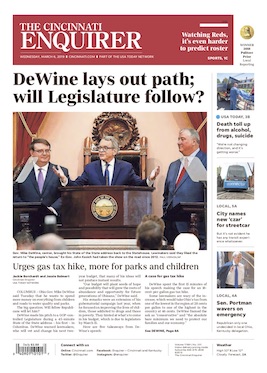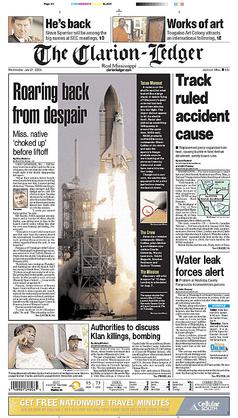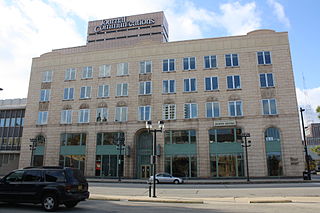
The Ku Klux Klan, commonly shortened to the KKK or the Klan, is the name of several historical and current American white supremacist, far-right terrorist organizations and hate groups. According to historian Fergus Bordewich, the Klan was "the first organized terror movement in American history." Their primary targets at various times have been African Americans, as well as Jews and Catholics.

Nathan Bedford Forrest was a Confederate Army general during the American Civil War and was later the first Grand Wizard of the Ku Klux Klan from 1867 to 1869.

The Tennessean is a daily newspaper in Nashville, Tennessee. Its circulation area covers 39 counties in Middle Tennessee and eight counties in southern Kentucky. It is owned by Gannett, which also owns several smaller community newspapers in Middle Tennessee, including The Dickson Herald, the Gallatin News-Examiner, the Hendersonville Star-News, the Fairview Observer, and the Ashland City Times. Its circulation area overlaps those of the Clarksville Leaf-Chronicle and The Daily News Journal in Murfreesboro, two other independent Gannett papers. The company publishes several specialty publications, including Nashville Lifestyles magazine.

The Cincinnati Enquirer is a morning daily newspaper published by Gannett in Cincinnati, Ohio, United States.

WLMT is a television station in Memphis, Tennessee, United States, affiliated with The CW and MyNetworkTV. It is owned by Tegna Inc. alongside ABC affiliate WATN-TV. The two stations share studios at the Shelby Oaks Corporate Park on Shelby Oaks Drive in northeast Memphis; WLMT's transmitter is located in the Brunswick section of unincorporated northeast Shelby County.
WKNO is a PBS member television station in Memphis, Tennessee, United States. The station is owned by the Mid-South Public Communications Foundation, a non-profit organization governed by a board of trustees composed of volunteers, and is operated alongside NPR member WKNO-FM (91.1). The two stations share studios on Cherry Farms Road with the TV station's transmitter on Raleigh LaGrange Road, both in the Cordova section of unincorporated Shelby County.

The Montgomery Advertiser is a daily newspaper and news website located in Montgomery, Alabama. It was founded in 1829.

The Clarion Ledger is an American daily newspaper in Jackson, Mississippi. It is the second-oldest company in the state of Mississippi, and is one of the few newspapers in the nation that continues to circulate statewide. It is an operating division of Gannett River States Publishing Corporation, owned by Gannett.

The Knoxville News Sentinel, also known as Knox News, is a daily newspaper in Knoxville, Tennessee, United States, owned by the Gannett Company.

The following are the Pulitzer Prizes for 1928.
Hazel Freeman Smith was an American journalist and publisher, the owner and editor of four weekly newspapers in rural Mississippi, mostly in Holmes County. Her newspapers included the Lexington Advertiser, the second oldest newspaper in the state. She distinguished herself both in reporting and editorial writing, advocating for justice for African Americans in the county and the state.

Journal Media Group was a Milwaukee, Wisconsin-based newspaper publishing company. The company's roots were first established in 1882 as the owner of its namesake, the Milwaukee Journal, and expanded into broadcasting with the establishment of WTMJ radio and WTMJ-TV, and the acquisition of other television and radio stations.

The Memphis sanitation strike began on February 12, 1968, in response to the deaths of sanitation workers Echol Cole and Robert Walker. The deaths served as a breaking point for more than 1,300 African American men from the Memphis Department of Public Works as they demanded higher wages, time and a half overtime, dues check-off, safety measures, and pay for the rainy days when they were told to go home.
WBBP is a commercial radio station licensed to Memphis, Tennessee, featuring a gospel format. Owned by Bountiful Blessings, an extension of the Temple of Deliverance Church of God in Christ, the station serves the Memphis metropolitan area. WBBP's studios are located at the Temple of Deliverance's headquarters in Memphis, while the transmitter is located in the city's southeastern side. In addition to a standard analog transmission, WBBP is available online.

WLOK is a commercial radio station licensed to Memphis, Tennessee, carrying a gospel music format. Owned by the Gilliam family doing business as WLOK Radio, Inc., the station serves the Memphis metropolitan area. WLOK's studios are located in Downtown Memphis and the transmitter resides in Memphis's Glenview Historic District. In addition to a standard analog transmission, WLOK is relayed over low-power Memphis translator W285FI and is available online.

The Memphis Press-Scimitar was an afternoon newspaper based in Memphis, Tennessee, United States, and owned by the E. W. Scripps Company. Created from a merger in 1926 between the Memphis Press and the Memphis News-Scimitar, the newspaper ceased publication in 1983. It was the main rival to The Commercial Appeal, also based in Memphis and owned by Scripps. At the time of its closure, the Press-Scimitar had lost a third of its circulation in 10 years and was down to daily sales of 80,000 copies.
Howard Goodloe Sutton was an American newspaper editor, publisher, and owner. From 1964 to 2019, he published The Democrat-Reporter, a small weekly newspaper in Linden, Alabama. Sutton was widely celebrated in 1998 for publishing over four years a series of articles that exposed corruption in the Marengo County Sheriff's Office; he received awards and commendations and was suggested as a candidate for the Pulitzer Prize. In 2019, Sutton once again became the focus of national attention when he wrote and published an editorial suggesting the Ku Klux Klan be revived to "clean out" Washington, D.C. He already had a local reputation for other, similarly inflammatory racist, sexist, anti-Semitic, anti-Muslim, and homophobic editorials.
J.P. Alley (1885–1934) was an editorial cartoonist whose work attacking the Ku Klux Klan brought his employer, the Memphis Commercial Appeal newspaper, the 1923 Pulitzer Prize for Public Service. He was best known for his Hambone's Meditations, a syndicated comic strip featuring a racist, Jim Crow caricature of an African American man.
Edward John Meeman was an American journalist and editor.
The 1918 West Tennessee State Normal football team was an American football team that represented West Tennessee State Normal School as an independent during the 1918 college football season. In their first season under head coach John Childerson, West Tennessee State Normal compiled a 2–4 record.














